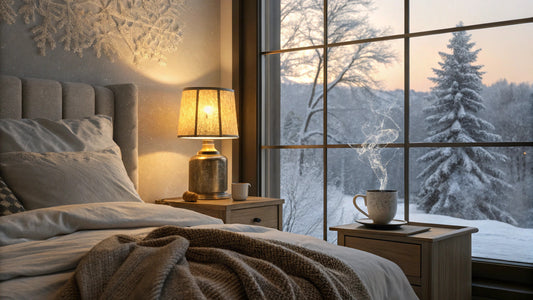
Neurodivergent-Friendly Sleep Tools That Actually Work
Sleep doesn’t always come easy, especially if you’re neurodivergent. ADHD, autism, and sensory sensitivities can make falling asleep and staying asleep feel like an uphill battle. The good news is there are tools designed to support your nervous system and make rest more accessible.
Quick answer: The best neurodivergent-friendly sleep tools reduce sensory overload and help regulate the nervous system. Weighted blankets, sound machines, light filters, and sensory-safe routines can create an environment that signals safety and calm.
🧠 Why Sleep Can Be Harder for Neurodivergent People
Neurodivergence often comes with unique sleep challenges:
-
ADHD: Racing thoughts, difficulty winding down, irregular sleep-wake cycles.
-
Autism: Heightened sensory sensitivity, reliance on routine, difficulty regulating melatonin.
-
Anxiety: Nervous system stuck in "on" mode, leading to restless nights.
Your brain may struggle to filter out stimulation, making it harder to relax and enter deep sleep. That’s why tools that target the nervous system and sensory environment are so effective.
🌙 Tools That Actually Help With Sleep
Here are proven, neurodivergent-friendly sleep tools that support rest naturally:
1. Weighted Blankets
Deep pressure stimulation helps calm an overactive nervous system. Many autistic and ADHD individuals find weighted blankets grounding and sleep-promoting.
-
Pick one that’s about 10% of your body weight.
-
Knitted versions are more breathable for hot sleepers.
Why it works: Signals safety, reduces cortisol, boosts serotonin and melatonin.
2. Noise Management
Background sounds can either soothe or overwhelm.
-
White noise or brown noise machines mask disruptive sounds.
-
Noise-canceling headphones or earplugs help in noisy environments.
-
Nature sounds (rain, ocean, forest) can create a calming association.
Why it works: Consistent sound reduces sensory spikes and helps the brain settle.
3. Light Control
Neurodivergent brains are often sensitive to light. Managing brightness and color makes a huge difference.
-
Blue light glasses or screen filters in the evening.
-
Blackout curtains to keep the room dark.
-
Soft amber or red night lights if total darkness feels unsafe.
Why it works: Helps regulate melatonin and reduces sensory stress.
4. Sensory-Friendly Bedding
Textures matter. The wrong fabric can make sleep impossible.
-
Breathable cotton, bamboo, or linen sheets.
-
Minimal seams, tags, or scratchy fabrics.
-
Consider cooling pillows or mattress toppers if you overheat.
Why it works: Reduces sensory irritation so your body can relax.
5. Body-Based Tools
-
Compression sheets or body socks: Gentle pressure without heaviness.
-
Body pillows: Provide grounding and comfort for restless sleepers.
-
Weighted lap pads: Useful for calming down before bed.
Why it works: Gives physical feedback that regulates the nervous system.
6. Routine Anchors
Neurodivergent brains thrive on cues and rituals.
-
A wind-down playlist you play every night.
-
The same scented candle or essential oil before bed.
-
A written or visual bedtime checklist.
Why it works: Repetition teaches your body and brain that it’s time to sleep.
✅ Final Thoughts: Build Your Own Toolkit
There’s no one-size-fits-all solution for neurodivergent sleep. The key is combining tools that address your unique sensory needs and nervous system regulation.
Start with one or two changes, like adding a weighted blanket or using blackout curtains, and notice how your body responds. Over time, you can build a bedtime toolkit that feels safe, supportive, and tailored to you.
Summary: Neurodivergent-friendly sleep tools like weighted blankets, noise machines, light filters, and sensory-safe bedding help calm the nervous system and reduce sensory overload. When combined with routines, they make restful sleep much more achievable.
❓ FAQ
What is the best sleep tool for ADHD?
Weighted blankets and white noise machines are often the most effective, as they calm restlessness and racing thoughts.
Do weighted blankets help with autism?
Yes. They provide deep pressure stimulation, which many autistic people find calming and sleep-inducing.
What if I can’t stand heavy blankets?
Try compression sheets, lighter knitted weighted blankets, or body socks for a gentler option.
How can I make my bedroom more sensory-friendly?
Dim lighting, calming textures, consistent background sounds, and minimizing clutter all help reduce overstimulation.



